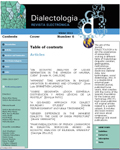A speech act analysis of selected yoruba anthroponyms
Article Sidebar

Main Article Content
This work employs a speech act approach to the analysis of Yorùbá indigenous names to emphasize that they are not mere labels. Thirty eight Yorùbá indigenous names were classified into eight different groups, using factors like relationship to royalty, acknowledging the greatness of Islamic, Christian or traditional deities, circumstances or events at birth, family vocation or profession, infantile mortality, importance of children to the family, ‘natural’ names and admonitions. From the analysis carried out, Yorùbá indigenous names were shown to perform speech acts like ‘assertive’, ‘directive’, ‘commissive’, ‘expressive’ and ‘declaration’, together with varying sub4acts. This shows them to be utterances that derive" their" meanings from the cultural beliefs of the Yorùbá people, rather than being mere labels. Thus their understanding will help in understanding aspects of the cultural practices of the Yorùbá people and, consequently, the people themselves.